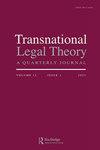人类世的跨国环境法
Q2 Social Sciences
引用次数: 14
摘要
摘要气候变化、生物多样性丧失、海洋退化和大流行病标志着2020年。本文介绍了一期在人类世背景下质疑跨国环境法的特刊,并邀请人们根据不断变化的地球现实反思法律的含义和作用。法律如何与全球环境问题相互作用和治理是法律学者在过去十年中积极应对的一个挑战,最近,人类世的概念也成为研究人员开始努力解决的一个话题。为解决全球环境问题而出现的一种研究途径是跨国环境法。采用“跨国法”作为分析环境法的视角或框架,对评估和部署法律以应对全球环境挑战的方式采取了更广泛的方法。本特刊中的文章集及时介入了在全球重大不确定性和环境危机时期跨国环境法的理论和实践方法。本文章由计算机程序翻译,如有差异,请以英文原文为准。
Transnational environmental law in the Anthropocene
ABSTRACT Climate change, biodiversity loss, marine degradation and a pandemic have marked 2020. This article introduces a Special Issue that interrogates transnational environmental law in the context of the Anthropocene and invites reflection on the meaning and role of law in light of changing planetary realties. How law interacts with and governs the global environmental problems is a challenge that legal scholars have approached with vigour over the last decade and, more recently, the concept of the Anthropocene has become a topic that researchers have also begun to grapple with. One avenue of research that has emerged to address global environmental problems is transnational environmental law. Adopting ‘transnational law’ as a lens or framework through which to analyse environmental law takes a broader approach to the ways in which law may be assessed and deployed to meet global environmental challenges. The collection of articles within this Special Issue provide a timely intervention into the theoretical and practical approaches of transnational environmental law in a time of significant global uncertainty and environmental crisis.
求助全文
通过发布文献求助,成功后即可免费获取论文全文。
去求助
来源期刊

Transnational Legal Theory
Social Sciences-Law
CiteScore
2.10
自引率
0.00%
发文量
7
期刊介绍:
The objective of Transnational Legal Theory is to publish high-quality theoretical scholarship that addresses transnational dimensions of law and legal dimensions of transnational fields and activity. Central to Transnational Legal Theory''s mandate is publication of work that explores whether and how transnational contexts, forces and ideations affect debates within existing traditions or schools of legal thought. Similarly, the journal aspires to encourage scholars debating general theories about law to consider the relevance of transnational contexts and dimensions for their work. With respect to particular jurisprudence, the journal welcomes not only submissions that involve theoretical explorations of fields commonly constructed as transnational in nature (such as commercial law, maritime law, or cyberlaw) but also explorations of transnational aspects of fields less commonly understood in this way (for example, criminal law, family law, company law, tort law, evidence law, and so on). Submissions of work exploring process-oriented approaches to law as transnational (from transjurisdictional litigation to delocalized arbitration to multi-level governance) are also encouraged. Equally central to Transnational Legal Theory''s mandate is theoretical work that explores fresh (or revived) understandings of international law and comparative law ''beyond the state'' (and the interstate). The journal has a special interest in submissions that explore the interfaces, intersections, and mutual embeddedness of public international law, private international law, and comparative law, notably in terms of whether such inter-relationships are reshaping these sub-disciplines in directions that are, in important respects, transnational in nature.
 求助内容:
求助内容: 应助结果提醒方式:
应助结果提醒方式:


